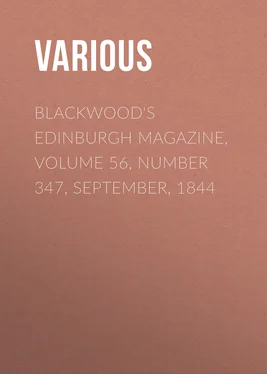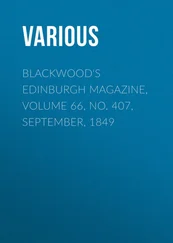Various - Blackwood's Edinburgh Magazine, Volume 56, Number 347, September, 1844
Здесь есть возможность читать онлайн «Various - Blackwood's Edinburgh Magazine, Volume 56, Number 347, September, 1844» — ознакомительный отрывок электронной книги совершенно бесплатно, а после прочтения отрывка купить полную версию. В некоторых случаях можно слушать аудио, скачать через торрент в формате fb2 и присутствует краткое содержание. Издательство: Иностранный паблик, Жанр: foreign_antique, periodic, foreign_edu, на английском языке. Описание произведения, (предисловие) а так же отзывы посетителей доступны на портале библиотеки ЛибКат.
- Название:Blackwood's Edinburgh Magazine, Volume 56, Number 347, September, 1844
- Автор:
- Издательство:Иностранный паблик
- Жанр:
- Год:неизвестен
- ISBN:нет данных
- Рейтинг книги:3 / 5. Голосов: 1
-
Избранное:Добавить в избранное
- Отзывы:
-
Ваша оценка:
- 60
- 1
- 2
- 3
- 4
- 5
Blackwood's Edinburgh Magazine, Volume 56, Number 347, September, 1844: краткое содержание, описание и аннотация
Предлагаем к чтению аннотацию, описание, краткое содержание или предисловие (зависит от того, что написал сам автор книги «Blackwood's Edinburgh Magazine, Volume 56, Number 347, September, 1844»). Если вы не нашли необходимую информацию о книге — напишите в комментариях, мы постараемся отыскать её.
Blackwood's Edinburgh Magazine, Volume 56, Number 347, September, 1844 — читать онлайн ознакомительный отрывок
Ниже представлен текст книги, разбитый по страницам. Система сохранения места последней прочитанной страницы, позволяет с удобством читать онлайн бесплатно книгу «Blackwood's Edinburgh Magazine, Volume 56, Number 347, September, 1844», без необходимости каждый раз заново искать на чём Вы остановились. Поставьте закладку, и сможете в любой момент перейти на страницу, на которой закончили чтение.
Интервал:
Закладка:
My countenance, during the Yankee’s interminable directions, must have somewhat resembled that of a French recruit, to whom some scarred and mustached veteran is relating his Egyptian campaigns, and telling him wonderful stories of snakes and crocodiles at least half a mile long—monsters who made nothing of swallowing a drum-major to their breakfast, bearskin cap, cane, and whiskers, included. I was so completely bothered and confounded with the rights and lefts, that the metal-buttoned individual was out of sight and hearing before I thought of explaining to him, that, dark as it then was, we should never be able to find even the walnut-tree, let alone neighbour Dims’s hedge and the break-neck rocks. Patience is by no means one of my virtues; but the man’s imperturbable phlegm and deliberation, in the midst of the most pouring rain that ever wetted poor devil to the skin, tickled my fancy so exceedingly, that the sound of his horse’s hoofs had hardly died away, when I burst into an almost interminable fit of laughter. “First right, then left—look out for the big walnut-tree, and don’t break your neck over the crags!” repeated I, in a tone between merriment and despair. Richards, however, saw nothing to laugh at.
“The devil take the Yankee!” cried he. “May I be hanged if I know what you find so amusing in all this!”
“And hang me if I know how you manage to look so grave!” was my answer.
“How could we possibly have missed the ferry?” cried Richards; “and, what is still more stupid, to come back instead of going forward!”
“Not very astonishing,” replied I, “considering the multitude of by-roads and cross-roads, and waggon-tracks and cattle-paths, and the swamp into the bargain. It is quite impossible to see which way the river runs. And then you have been sleeping all the afternoon, and I had to find the way by myself.”
“And you found it after an extraordinary fashion—retracing your own steps,” said Richards in a vexed tone. “It is really too stupid.”
“Very stupid,” said I—“to sleep.”
As may be seen, we were on the verge of a quarrel; but we were old and sincere friends, and stopped in time. The discussion was dropped. The fact was, that our mistake was by no means a very surprising one. The country in which we were, seemed made on purpose to lose one’s-self in. The road winds along at some distance from the river, frequently out of sight of it; the shore is uneven, covered with crags and hillocks; nothing like a landmark to be seen, or a mountain to guide one’s-self by, except occasionally, when one gets a peep at the Appalachians rising out of the blue distance. The fog, however, had hidden them from us, and that just at the time when we most wanted them as guides. We found ourselves in a long low clearing—a sort of bottom, as they call it in that country—which was laid out in sugar-fields, and through which there ran nearly as many cart-roads as there were owners to the land. The morning had been bright and beautiful; but, towards noon, a grey mist had begun to rise in the south-western corner of the horizon, and had gone on, thickening and advancing, till it spread like a pall over the Tennessee. With a grey wall of fog on one side, and the swamp, intersected with a hundred cross-paths, on the other, we had gone on for about a mile; until it got so thick and dark, that it was quite as possible we should find our way into the marsh as over the Mussel shoals. 4 4 The Mussel shoals are broad ridges of rocks, above Florence, which spread out into the Tennessee.
So certain was I, however, of the proximity of the latter, that I pushed on, expecting each moment to find the ferry, until the unlucky Yankee brought all my hopes to a termination.
It was now quite night—one of those dreary pitch-dark nights that are of no unfrequent occurrence in the south-western states. I would as soon have been on the banks of Newfoundland as in this swamp, from which nothing was more probable than that we should carry away a rattling fever. The Yankee’s directions concerning the road were, as may be supposed, long since forgotten; and even had they not been so, it would have required cat’s eyes to have availed ourselves of them. Even the owls, the nightingales of that neighbourhood, seemed puzzled by the extreme darkness. We could hear them whooping and screaming all around us; and now and then one flew against us, as if it had lost its way as well as ourselves. The road we were now following ran close to the bank of the river; so close, indeed, that a single stumble of our horse might have precipitated us into the water, which was then very high.
“I think we should do our best to get out of the gig,” said I to my companion; “or else we have a very good chance of passing the night in the Tennessee.”
“No danger,” replied Richards, “Cæsar is an old Virginian.”
A shock that made our very ribs crack again, and as nearly as possible threw us backwards out of the gig, came rather opportunely to interrupt this eulogium on Cæsar, who had suddenly reared furiously up on his hind-legs.
“There must be something in the path,” cried Richards. “Let us see what it is.”
We got out, and found a huge walnut-tree lying right across the road. Here was an end to our journey. It was an absolute impossibility to get the gig over the enormous trunk; the boughs, which spread out full twenty yards in every direction, had given Cæsar timely warning of the impediment to our further progress. The road, moreover, was so narrow that it was impossible to turn. There was nothing for it but to back out. Richards began hunting about for a cross-road, where we might turn; I set to work to back the gig. I had no sooner, however, set one foot out of the road, than my cloak was almost torn from my shoulders by a thorn half a yard long. To get through this detestable wilderness with a whole skin, one ought to have been cased in complete armour. I had only just taken my unfortunate garment off this new-fashioned cloak-peg, when Richards returned.
“This is the most infernal wilderness in all the west!” said he. “Neither road nor path, mud up to the ears, and, to add to my enjoyment, I have left one of my boots in the swamp.”
“And, for my part, there are as many holes in my cloak as thorns on that cursed acacia-tree,” replied I by way of consolation.
These were the last words we spoke in any thing like a jesting tone; for we were now wet to the skin: and of all situations, I believe a damp one to be the least favourable to jocularity. I confess a certain partiality for adventures, when they are not carried too far. There is nothing I detest like a monotonous wearisome Quaker’s journey, with every thing as tame, and dull, and uniform, as at a meeting of broad-brims; but to be overtaken by darkness and a deluge in the middle of a maple-swamp, to be unable to go three steps on one side without falling into the Tennessee, with an impenetrable morass and thicket on the other hand, a colossal walnut-tree barring the way in front, and no possibility of turning back—this was, even to my taste, rather too much of an adventure.
“Well, what is to be done now?” said Richards, who had placed himself in a sort of theatrical posture—his bootless foot on the gig-step, the other sticking fast in the mud.
“Take out the horse, and draw the gig back,” suggested I.
Easily said, but rather more difficult to accomplish. We set to work, however, with a will; and pushed, and tugged, and pulled, till at last, after much labour, we got the gig about thirty paces backwards, where the road became wider. We then turned it, and were putting Cæsar into the shafts, when, to our inexpressible delight, a loud hallo was given quite close to us.
Reader, if you were ever at a hard contested election, where you had bet your fifty or a hundred dollars on your favourite candidate, and just when you made sure of losing, and your five senses were almost extinguished by noise, brandy, and tobacco smoke, you heard the result proclaimed that secured you your stake, and a hundred per cent to boot; if you have ever been placed in such circumstances, then, and then only, can you form an idea of the joyful feeling with which we heard that shout. After such a thorough Yankee fashion was it given, that it caused the fog to break for a moment, and roused the obscene inhabitants of the neighbouring swamp from their mud-pillowed slumbers. They set up a screeching, and yelling, and croaking, that was lovely to listen to.
Читать дальшеИнтервал:
Закладка:
Похожие книги на «Blackwood's Edinburgh Magazine, Volume 56, Number 347, September, 1844»
Представляем Вашему вниманию похожие книги на «Blackwood's Edinburgh Magazine, Volume 56, Number 347, September, 1844» списком для выбора. Мы отобрали схожую по названию и смыслу литературу в надежде предоставить читателям больше вариантов отыскать новые, интересные, ещё непрочитанные произведения.
Обсуждение, отзывы о книге «Blackwood's Edinburgh Magazine, Volume 56, Number 347, September, 1844» и просто собственные мнения читателей. Оставьте ваши комментарии, напишите, что Вы думаете о произведении, его смысле или главных героях. Укажите что конкретно понравилось, а что нет, и почему Вы так считаете.












